New Product Review: The Wonderz of WireKnitZ
December 31, 2013
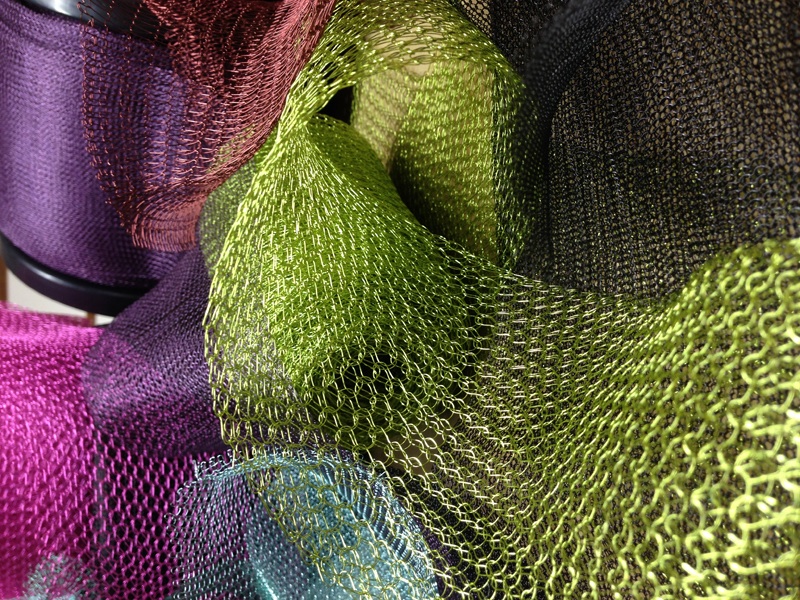 WireKnitZ is a tubular-knit copper wire. Its strength is its malleability, which enables makers to stretch, weave, fold, shape – and reshape – a form. This pre-knit wire also serves as a foundation for layering, felting, stitching, beading and many other techniques.
WireKnitZ is a tubular-knit copper wire. Its strength is its malleability, which enables makers to stretch, weave, fold, shape – and reshape – a form. This pre-knit wire also serves as a foundation for layering, felting, stitching, beading and many other techniques.
Originator Norma Melton, formerly a decorative art consultant, founded WireKnitZ 4 years ago after reading an article about knitting with wire. She tried making a cuff by integrating knitted wire with beach glass finds but found it very hard on her hands. This inspired a search for a manufacturer she could work with to create a pre-knitted wire for the marketplace.
That marketplace (at wireknitz.com) now offers 3 knit styles – tight, medium, and coarse; 2 widths – 5/8” and 3.34”; and 2 wire gauges – fine and heavy. These features are combined in various ways across 5 wire types. A polyurethane enamel finish in a wide variety of colors offers creative choices, but WireKnitZ also comes in a non-coated (bare) stainless steel knit.
Prices range from $11.20 to $45.00 per meter with all but the 1000 series available in 9” increments.
WireKnitZ is easily cut with scissors. Wire cutters are unnecessary! The tubular form may be used as is or cut open for use as a single layer. While its flexibility is a major feature, the heavy gauge tight knit becomes work-hardened and will hold a firm shape.
For jewelry, the ends can be finished off with a variety of clasps and attachments or even felted together. For other types of work, the ends may be folded under or left raw.
Jewelry-maker Pat Pawlowicz combines WireKnitZ with felting. She calls WireKnitZ “the perfect medium for felting”; its lightweight nature allows her to use magnetic clasps.
She may shape the knitted wire prior to felting or while the work is in progress. To finish her work (using a notched needle), Pawlowicz either felts the sharp ends of her bracelets and sews on a clasp or felts the ends together. She sews on beads and sequins with Nymo thread.
Specializing in the use of polymer clay, Arbel Shemesh has integrated WireKnitZ into both masks and jewelry.
Ignoring its tubular form, she cuts it open for a single layer then literally mashes the clay embellishments into the knitted wire. To finish the edges, she uses a beading needle and goes in and out of the loops, turning the wire under. Then she bakes the pieces to cure the clay for durability and color. Baking does not change the color of WireKnitZ or affect it in other ways.
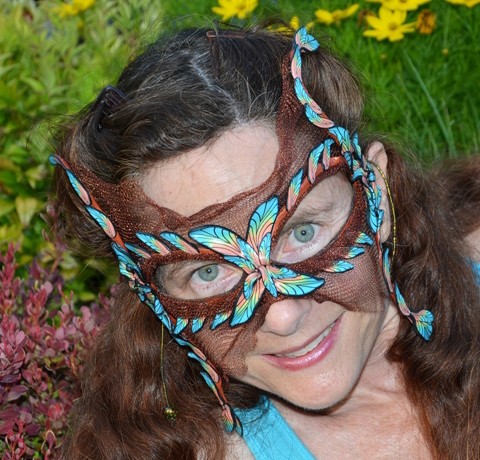 Shemesh also mentions the lightweight nature of the knitted wire as a strong attribute because it makes the masks and necklaces comfortable to wear. She is now working with WireKnitZ’s tubular structure, saying, “I feel like I’ve just started to explore the possibilities.”
Shemesh also mentions the lightweight nature of the knitted wire as a strong attribute because it makes the masks and necklaces comfortable to wear. She is now working with WireKnitZ’s tubular structure, saying, “I feel like I’ve just started to explore the possibilities.”
Artist, educator (and SDA member) Leisa Rich has experimented with WireKnitZ in a variety of forms – from sculpture to art quilts. “WireKnitZ is incredibly fun to work with and has a tremendous amount of possibilities” she states.
In Disco Metastasis Rich’s sculptural experimentation includes injecting silicone then free-motion stitching into the WireKnitZ.
In other pieces, such as Burn Rubber, she incorporated Fosshape 300. (Fosshape 300 is a heat-activated, felt-like fabric for creating rigidity, stiffness and surface enhancement without the use of water, messy or hazardous additives. Find out more about it at wonderflexworld.com)
She finds WireKnitZ can be “treated gorgeously as jewelry” and adds, “I don’t think anyone has yet stretched far enough artistically with WireKnitZ.”
Artist, author, educator (and SDA President) Jane Dunnewold also experimented with WireKnitZ and found it intriguing – with a good range of colors and densities.
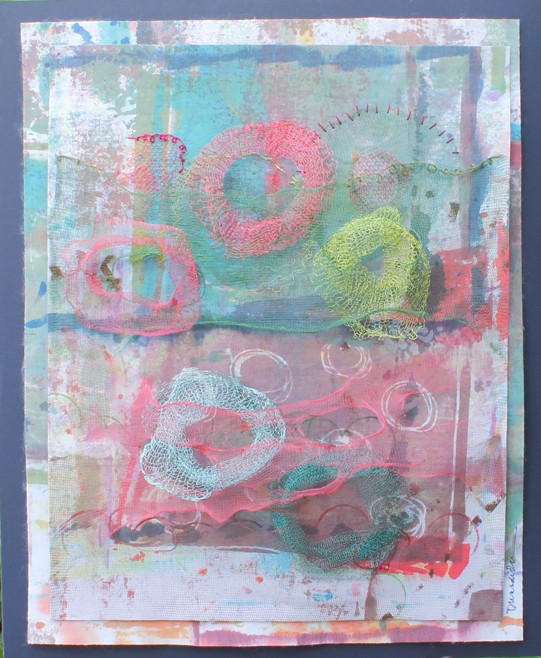 “I loved pulling it apart and stretching it to create forms that lifted away from the surface. The color range made it easy to match the hand painted and screened background colors, so the dimension was a neat effect,” she observed.
“I loved pulling it apart and stretching it to create forms that lifted away from the surface. The color range made it easy to match the hand painted and screened background colors, so the dimension was a neat effect,” she observed.
Dunnewold also saw incredible potential for embroidering over WireKnitZ and wished she had more time to take it farther. She could see strong possibilities for jewelry but felt a lot could be done as a textile substrate where metal-smithing and textile techniques co-mingle. Her students have been exploring incorporating WireKnitZ into other substrates – one example being embedding it into a wet plaster surface.
Echoeing Rich’s sentiment regarding potential, she states, “As with any new product or process there is a learning curve. If I had a weekend to play with WireKnitZ I would discover 10 more things it could do. Would I like them? Hard to say. So I think it is like anything else. It demands respect, time and thoughtful exploration to see what it really can do.”
WireKnitZ may also be found in selected bead, fabric and craft stores via a directory at wireknitz.com/where-to-buy-wireknitz
_____________________________
 Kathie R. Kerler has been a contributing editor to American Quilter magazine since 2007. She judges quilt and textile art nationally and is certified to evaluate master quilts through National Quilting Association’s Master Quilt Program. She has completed rigorous courses in design and embroidery at London City and Guilds College in London (UK) and at Lesage School of Needlework in Paris (FR).
Kathie R. Kerler has been a contributing editor to American Quilter magazine since 2007. She judges quilt and textile art nationally and is certified to evaluate master quilts through National Quilting Association’s Master Quilt Program. She has completed rigorous courses in design and embroidery at London City and Guilds College in London (UK) and at Lesage School of Needlework in Paris (FR).
Kerler exhibits individually and with the group STiTCH at museums and galleries. In 2010, she won the Evolutions Challenge at Rocky Mountain Quilt Museum for innovative work which earned her a 2011 solo exhibition. She has also been honored to create a commissioned quilt for Clackamas County Oregon’s 2009 Sesquicentennial.
She is an SDA member; this is her first story for SDA NewsBlog. Visit her website at www.kathiekerler.com
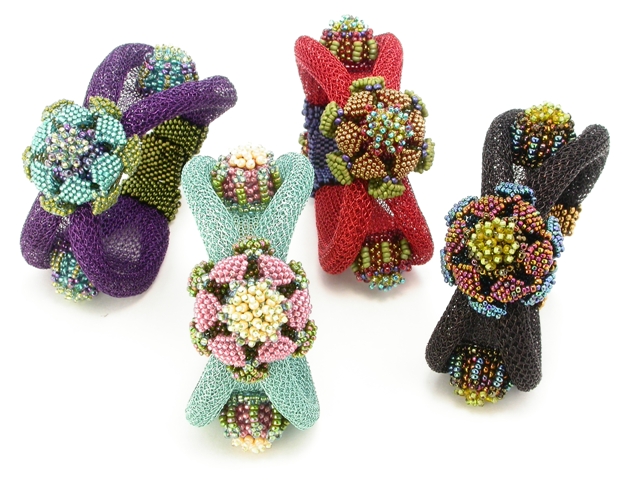
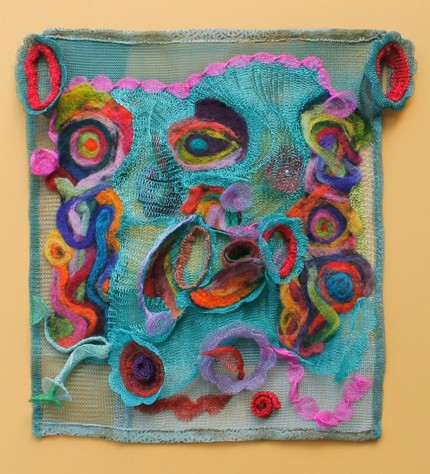
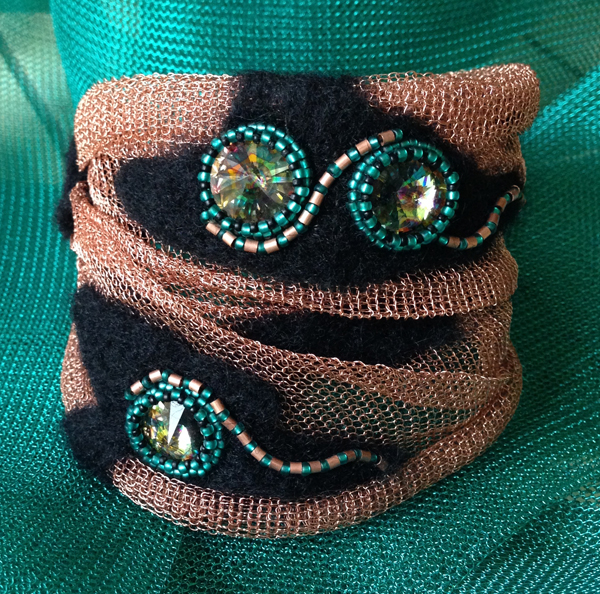
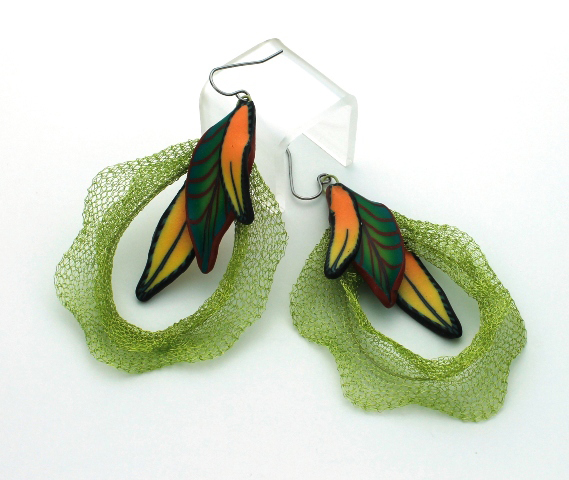
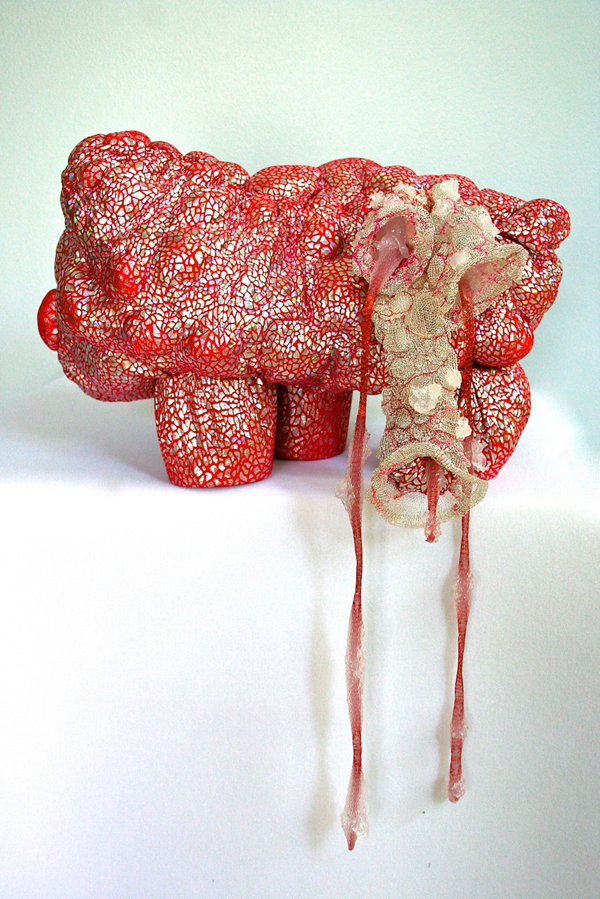
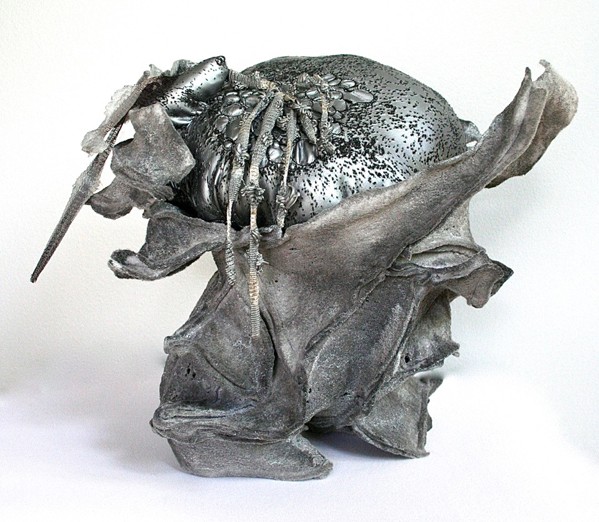
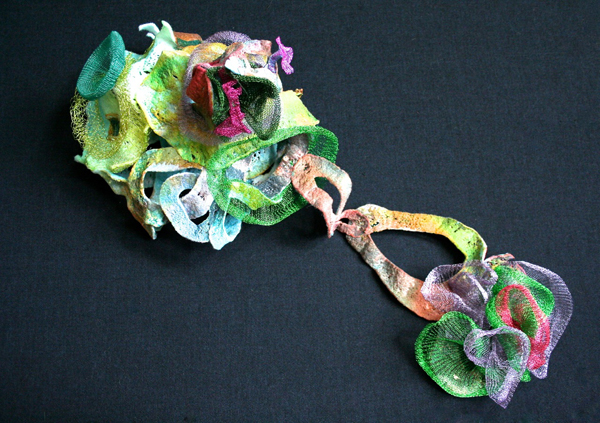



2 Comments
Linda McNelly says
January 9, 2014 at 9:17 am
Where can I buy the wire
NewsBlog Editor says
January 10, 2014 at 10:34 am
Information on where to buy WireKnitz is given in the story.
Related Blog Articles
Beadwork
Friday Fibers Roundup: Non-Textiles // Crochet
Beadwork
Friday Fibers Roundup: Embedded Quilts
Beadwork
Friday Fibers Roundup: Embroidered Flora